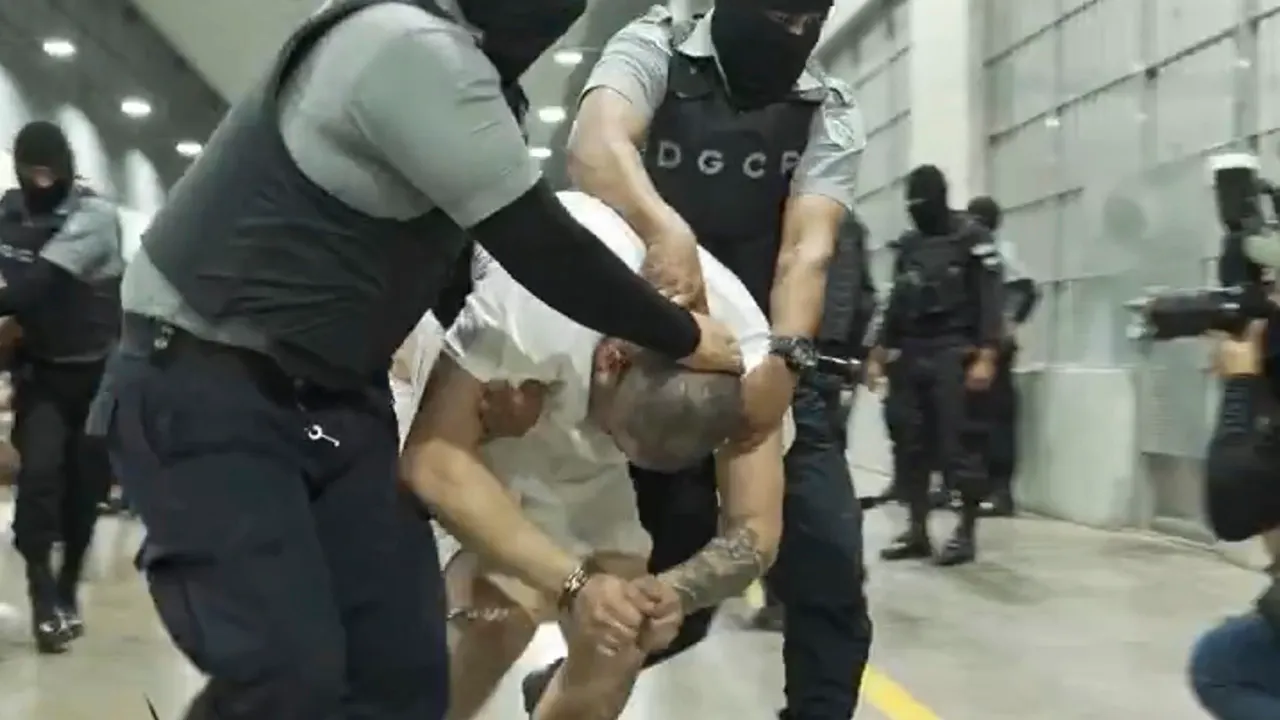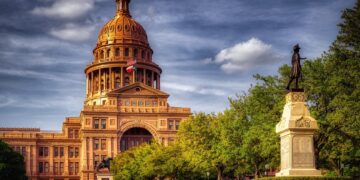Who’s been in office here for a decade, who’s gonna walk us through his perspective and his understanding of the situation. Let’s do this. All right, sheriff, where are we going? – Well, we’ll hit the remote part first and then we’ll get back into town.
Or, we can do vice versa, whatever you wanna do. – Where’s the more interesting part? – Well, it’s all interesting. – Okay, let’s do remote. – That’s where all the people are dying. So, Yuma County, 5,500 square miles. I got 95 deputies that patrol all of this. – Okay. – 24 hours a day, seven days a week. The cartels have designated locations along the border they allow people to cross. Then the cartels also have designated areas
That they control, where their narcotics come across. And those that do not want to be apprehended, are also guided through. Anybody that crosses the border here, is paying anywhere from $6,000 per person up to $15,000. It all depends on what country you came from. So, those that are coming from Russia, Iran, Iraq,
Afghanistan, Uzbekistan, the Ukraine, they’re paying more to get here. – You’re getting migrants from that part of the world? – Oh yeah, 140 different countries. You figure this last federal fiscal year in Yuma County, just on the river corridor, there were over 310,000 people that were apprehended and processed by Border Patrol Agents.
And then out in the eastern part of my county, in the remote desert, there’s over 28,000 getaways that they know of for sure. There could be more. That’s the impact for Yuma sector Border Patrol, which is either the second, or third smallest Border Patrol sector in the whole, for US Border Patrol.
So, they’re running maybe 800 agents, that had to handle over 310,000 people. There’s the border right there. – [Peter] Where? Oh, the fence is up there? – [Sheriff] Yeah. – What I was told in South Texas, was the fence isn’t gonna stop anyone. 32 foot fence, 33 foot ladder, whatever, right?
But it makes it easier for Customs and Border Protection to deal with it because they can set up the infrastructure on the fence. – [Sheriff] Right. – You can see where people are all pinching together to go over whatever. – [Sheriff] Right. – Is that your understanding? – It’s a deterrent.
And yes, they do use ladders, but ergo you have cameras, you have sensors, it does slow down that criminal element, so that Border Patrol can actually respond and get there to be able to apprehend it. And it keeps individuals from impacting our farmers. When most people hear Yuma, Arizona, they think of desert.
What you need to understand is Yuma County supplies the whole of the United States, 90% of your winter leafy greens. When you have these gaps in the fencing that were stopped, it’s just an open area and it funnels the cartels… This is one of the crossing points, is right down here.
And there’s where it impacts our farmers, because those individuals were going into those fields and defecating and the trash was being left there. As a farmer because of food safety, you can’t harvest that area. It’s now contaminated. – [Peter] What do they do? – They just have to plow it under.
So where we’re at here is Morelos Dam, obviously United States. Mexico, right across the river. Cartels designated this as one of the crossing points. So, you can see where that pickup is at, there’s a little road that goes down. So, they get off at the airport, Mexicali, take their Uber, bus.
– Get get off at the airport? – Yeah. They all fly into Mexicali. Everybody that’s coming here, is flying in. – They’re not doing the long hard journey, through the country? – No, none of these folks are doing that. They’re flying in. Some of these countries…
They have to manipulate airports according to whether, or not that country requires a visa. Some of the Russians were going out through Dubai and other countries to make it all the way into Cabo. Then spend a couple weeks in Cabo, and then they would fly into Mexico City, then into Mexicali.
So, all these different 140 plus countries, they’re all educated enough to figure out how to get from airport, to airport, to airport. – [Peter] So- – 310,000 have crossed this area of the river corridor from here, between here and about eight miles. – [Peter] You guys down here were putting storage containers, right?
– Right, the governor… – To block the gaps here? – Right. They pulled all the containers out because, finally this administration has decided that, they need to finish this portion because of the amount, sheer amount in volume of people coming in here illegally.
– [Peter] So, this fence is gonna be built here soon? – They’re supposed to be contracted out to put in the rest of this gap, but not all gaps. And I’ll show you that out. So, they just walk off the bus, walk down that little trail right there, come across right here.
So, you’re not even getting wet. – [Peter] And then who gets ’em here, on the Arizona side? – Border Patrol. – That’s so interesting. So, they wanna get caught. – Oh yeah, it’s what we call give ups. These are individuals that those countries won’t take ’em back.
– [Peter] The Russians won’t take ’em back? – No. – [Peter] Okay, so once they- – Well, they claim an asylum, because they’re coming from a country of violence. Okay. So, once they get in, Customs Border Protection- – Takes them in. – Right. – Processes them. – Correct.
– And then they have an asylum court hearing. – Well, they’re given a notice to appear, wherever they’re going in the US. You gotta have a sponsor. – [Peter] Okay. – And I picked up pieces of paper showing addresses within the interior of the United States, Wisconsin, New Jersey,
Where that’s where they’re going. – [Peter] What’s your understanding of the backlog right now, when they have to appear in that state? – Before this administration came along, the backlog, as we understood it, was anywhere from seven to 11 years. Because, they had over 11 million illegals that were still pending,
Hearing. – [Peter] He’s going the other way. – [Peter] He’s going to Mexico. – [Sheriff] Oh sh*** – [Peter] Oh, there we go. – [Peter] Holy sh** – [Agent] I think he went that way. – [Sheriff] Did he? – Okay, the one guy went through the gap. This guy’s swimming right now. – [Sheriff] See him? He just went into the reeds. Literally, guys, we’ve been down here, just 10 minutes, or so. Wow. – [Sheriff] He’s still walking that way.
– [Agent] Is he on land? – [Sheriff] No, he is on the water. – [Agent] Okay. – [Sheriff] Yeah, I’m watching him. You gonna get the other one? Just two? – [Agent] Just two. – [Sheriff] Okay. – [Peter] So, I thought it would’ve been a nighttime thing,
But it’s all the time. – [Sheriff] All day long, every day. So, these are the ones that are the getaways. – [Peter] So, this guy will go back, hide in the reeds, wait a while? – [Sheriff] Yeah. And then, he’ll come back. – [Peter] He doesn’t wanna get caught though. – [Sheriff] No.
– [Peter] Why doesn’t he wanna get caught? – Probably, ’cause he is either a prior deport, or he’s got a criminal history. You just heard him laughing. He thinks it’s funny. It’s all a game. – [Peter] It’s just cat and mouse. – [Sheriff] Yeah. – [Peter] It looks like a pretty big jump
He’s about to do. Ah, not too bad. It’s hard to explain guys. A very surreal part of the country. And until you see it firsthand, I know the video does a bit of capturing it, but here’s the opportunity. And many people want the opportunity. Very understandable. Why, wouldn’t you want to go where the opportunity is? I mean, like I’ve always said, I would do the same thing if I was living in poverty, or in a terrible situation. I would go for the US, but as an American, I want the legal process to be respected. – [Sheriff] Well..
– And we should know everyone who’s coming in our country. Right? – [Sheriff] He’s coming up beside you. – [Agent] Did you see that one leave the pond? – [Sheriff] Yeah, he’s going… he’s already over and working his way up towards the other side. – [Peter] You sprinted pretty hard there.
– I did, I’m out of breath. I need to start making running videos. – [Sheriff] Did you catch the other one? – Yeah, the second one was up by the train tracks. – [Sheriff] Oh, was he? Okay. – [Sheriff] Well at least he caught the one that was getting away. Yeah, I get it. But I mean, let me ask you something. What’s the threshold? – [Peter] Oh. – Of dealing with it? – Right there is a threshold. – This country cannot…
We cannot afford to take care of all these other countries’ issues. – Right. – I mean, right now you look at the massive amount of money being spent each and every day, by this administration dealing with this. So, you look at one tent to house individuals,
Just a sleep in it is about $4.5 million a month. – What do you mean? Oh, one of these big tents facilities? – One of these big tents that you see on the news $4.5 million. Now the other tents, are about $6.5 million because that’s where they have to cook the food
And feed the folks. And then you look at the fact that they got laundry services, so they can get their laundry done. And the fact that Border Patrol each and every day has to buy food and clothing to clothe these individuals. When does it stop? It’s $15-$16 million a month,
For HHS just to deal with the unaccompanied children that come across. That’s your tax dollar, or mine. – But we don’t have any problems in this country. So, we have plenty of money to spend. – Well, if you live in a bubble, you don’t have a problem. But we deal with reality here. We got it all figured out here. No issues in America. – Because there’s so many coming across and they were going out into these farm fields and defecating and littering. The county had to put up these porta johns at certain locations, so that they wouldn’t go out in the fields and contaminate the farm fields.
Why is the county having to pay that bill? – [Peter] Right. – The federal government has already said that immigration is their sole responsibility. Right? They’ve said that. Why aren’t they paying their bills? There are things in law enforcement, called ethics, integrity. I don’t get that outta Mayorkas at all. – [Peter] Okay,
And for those that don’t understand who Mayorkas is he’s- – He’s the Secretary of Homeland Security. His sole responsibility is the safety and security of this country. And he’s failing miserably. So, here’s all the fencing. – [Peter] Okay. – That’s just been sitting here. All this fencing that was bought by taxpayer money,
Just sitting there collecting dust. You’re down here now? – [Sheriff] I was showing him all the areas, where they’re cutting the fence and stuff like that, so… – [Peter] They’re cutting this with what a blow torch? – Oh, they’ll use the combination of wheel, ’cause they use the battery operated. – [Security agent] Angle grinder. – Angle grinder.
And then they’ll cut the metal and then they have to chisel out the concrete, ’cause each one of those post has concrete in them. Stay safe brother. – [Security agent] You too. – [Peter] Okay, so… Someone might hear, you got the fence, but they can cut a hole in it. So, why have the fence? – Again, it’s A, a deterrent. – B… The amount of time it takes them to be able to cut this. – [Peter] Yeah. – It gives the Border Patrol
The ability to come down here and intercept. So, when you see parts of the fence that have that patch on it. – [Peter] Okay, right there? – [Sheriff] That’s where they have cut right above that piece and that’s allowed them the ability to swing that fence post. – [Peter] Okay.
– [Sheriff] So, they can get through. And you see there’s a walkway all along the side of this fence. I’ve actually intercepted them, cutting the fence myself. And I got the one finger wave, ’cause it pissed them off. – [Peter] Can you do anything being sheriff or Border Patrol has to do it?
[Sheriff] Border Patrol has to do it. Arizona had 1070 law and that allowed us to charge an individual for smuggling. But the Obama administration sued the state of Arizona. It took ’em to court. Supreme Court said, “Yes, you’re right. “Federal responsibility is immigration. Smuggling is part of that.So, Arizona, you cannot charge a person for smuggling”. So, if we detain anybody for just an immigration violation, technically we can get charged by the Department of Justice for kidnapping. Figure that one out. Even if our officers respond to a domestic violence call,
And we find a house full of individuals that are in there. There’s nothing that we can charge that person with, knowingly that they are smuggling. Now, we can try to get a hold of Border Patrol, if they have people to respond. But that’s in Yuma.
All the rest of the places throughout the country, they don’t have access to Border Patrol, or HSI to come take the case. – [Peter] What’s the number one nationality you’re seeing these days? – [Sheriff] Right now… I think the top ones is Ecuador, then Columbia. – [Peter] What’s with OTM?
Have you heard of that, “Other Ehan Mexicans”? – Yeah, they’ve used that for years other than Mexican. That’s what all these are. I mean, you don’t see a whole lot of individuals from Mexico proper trying to come across, ’cause they’ll get returned immediately, because there’s that agreement with the country.
So, when you look at people talking about Title 42, that’s where they’re able to send individuals back to those countries. 95% of what comes across into Yuma is Title 8. These are individuals that are coming from countries, where that government won’t take them back. – [Peter] Are there cartels operating much
On this side of the border in Yuma? Are you dealing with them? – They’re on both sides. It’s safer for them to live over here. Think about it. So, you do have members of the cartel, that live in the US, all along the border. You have sicarios that live on the US side.
– [Peter] Sicarios? – Hitmen. – [Peter] Okay. – Those are what the cartels use to take out their opponents, let’s say. So, you have major narcotics groups all through the US. MS13 is is one that everybody’s familiar here with, well that’s why they’re integrated in all these communities
Because they work with the cartels, not only the narcotics side, but the human side as well. Because, if you can’t afford to pay the cartel, then you are going to pay them in another way. Human trafficking. So, they’re gonna pay according to what the cartel wants. So, if you got a kid,
They may use that kid to smuggle in other people, send ’em back to that country, bring in somebody else, portray a family unit. You may end up with- – [Peter] Portray a family unit… ’cause if you come in as a family unit… – You have quicker access to get into the US.
So, we’re coming up on the Cocopah tribal land and in Arizona, tribal land is sovereign land. And the Cocopah is a River People. So, they need access to the river, because that’s part of their…. – [Peter] So, on their tribal land, there’s no fence? – There’s no fence. There are bollards,
Or we call ’em Normandy barriers. And that’s used to keep the individuals that were smuggling narcotics. – [Peter] Okay. – From coming across in vehicles and UTVs. But again, here’s the porta johns that we had to do. Border Patrol had to put up a cover for shade.
– [Peter] So, this is for migrants coming in? – Yep. So, to give you an idea of the monstrosity that we’re dealing with here, this was all covered in trash. Some NGOs have come in and cleaned this up. But what I would find down here is, all these identification cards and passports.
I picked all these up myself. – [Peter] Just in the dirt out here? – Just on the ground. And we might find some again today. But see, these are individuals, that have fled countries of violence, then gone to another country, been allowed to stay there.
That’s what a lot of these green ones are. They’ve been allowed to reside in those countries and work and live. But that’s not what their original intent was. Their original intent was to get through that country, to get to the United States. So, they discard their passports, their ID cards,
And they portray themselves as somebody different, from their original country of violence. So, it’s a game. So, we share all this with HSI. So, every one of these have been shared with our federal government. But this is just a small snapshot, of what I’ve picked up down here
As far as passports. – So, if you’re from Venezuela, right? Let me try to walk through this, right? You come over, you come up through Mexico, right? You wanna discard your passport before you come over? – [Sheriff] Yeah, because everything’s given to you here.
– Okay, what happens if you come over with your passport, they’re gonna say? – Well, for some now, they’re allowed to stay. – Some are allowed to stay. – Yeah. – Okay. – But those individuals have already reestablished residency somewhere else. – So, maybe it’s a Venezuelan that lived in Mexico,
For five years. – Or a year. – Or a year, okay. – And their ultimate goal was to get here. – Right, I read a lot of the Haitians that came in, say this last summer, or whenever that was in the last year. – Yeah.
– A lot of ’em lived in Chile, or other places. Not even Haiti. – [Sheriff] Oh yeah. – And they recently came up. But they haven’t even been in Haiti for a long time. – [Sheriff] No. – [Peter] Okay. So, here’s where it ends. – [Sheriff] So, here’s where the fencing ends.
And this is the tribal land, as you can see. So, you have the Cocopah tribal land, which is sacred sovereign land. You get some border challenge coins. Look right here. See what I was telling you about? They tossed their money. So, this is all money.
They know when they get here, they’re gonna be able to.. – [Peter] Here’s a euro. – [Sheriff] Yeah, so. – [Peter] Look at that. – [Sheriff] Go ahead and pick ’em up. – [Peter] We have a euro. – [Sheriff] Don’t throw it back down, keep it. – [Peter] What is that?
– [Sheriff] I’ll put it in my package. – [Peter] It’s a peso. You’re a coin collector now, sheriff. – [Sheriff] Well, I use it for display. Display purposes. – [Peter] What coins have you seen? Like what are the most far out there coins? – [Sheriff] Well, I’m waiting to find something from Russia. – [Peter] We’re looking for Russian rubles out here, on the border. – [Sheriff] Anybody I bring down here… Well, you missed a bunch. You see right here? They tear up their IDs, they’re still doing it. – [Peter] Okay. – [Sheriff] They’ll tear up their identification card, because they don’t wanna get caught.
– [Peter] Chile. There’s some more right there. See, look, you’re missing a lot of money. – [Peter] More euros. This is crazy. – [Sheriff] When I bring- – [Peter] What a wild, I mean, you’re used to it, but what a wild part of the world. We’re right here. – [Sheriff] Yeah.
– [Peter] Yuma County. Then the Natives control this land. – [Sheriff] Right. – [Peter] We have euros in the dirt. – [Sheriff] Yeah. – And Russians and 140 nationalities getting through here, in some way, shape or form. – [Sheriff] Oh yeah. Here’s some more right here, look. See? More IDs tore apart.
– [Peter] Okay, so they just clip the IDs. – [Sheriff] See, if you put this together, it’ll have all the information you need. – [Peter] So, why do they do it right on the border? Why don’t they just do it like way in there? – [Sheriff] Lord only knows. – [Peter] Toothbrushes.
– [Sheriff] Yeah. – [Peter] So, it’s not an eco-friendly bunch. But that’s the last thing on their minds, obviously trying to get into another country. – Yeah, they don’t care. I mean, you look at some of this trash, I can show you pictures where,
All of this is just covered in trash, this whole area. But luckily an NGO came along and cleaned it up, because they knew senators were coming. And because the senators are coming, you gotta sanitize before they get here, to make it look like there’s not really a big issue.
– [Peter] ‘Cause you come here now and you’re like, “Ah, there’s no issue”, there’s no one trying to get over. – [Sheriff] Yeah. – [Peter] But you’re saying it pulses, like you have the tent set up there. You had a big rush here. Now, it’s somewhere else. – [Sheriff] Now it’s moved.
– We had the guy that we ran into down there obviously. – [Sheriff] Yeah. – [Peter] This guy’s got a full ID here. – [Sheriff] Oh, look, there’s all kinds of ’em right here. – [Peter] This guy’s from China. – [Sheriff] Yeah. That’s what I’m saying. – [Peter] I’m gonna be devil’s advocate
For one second, ready? – [Sheriff] Go right ahead. – Just go along with me here. – [Peter] We’re a country of immigrants. – [Sheriff] Right. – [Peter] We all came from somewhere. – [Sheriff] Right. – And we need immigration. – [Sheriff] Correct. – We need a workforce.
– [Sheriff] Okay. – We need brains. We need talent, we need work. But like you said before, there’s a threshold, like how much can you take? And everyone has a threshold as in like, they’re living in their house. – And all of a sudden they had 300 people
Show up on their front lawn, they would’ve reached their threshold, right? So, what is that threshold? Maybe that’s the big question, which nobody can really agree on, right? – [Sheriff] Well, you have these electeds and all you hear is, “We need to fix our immigration” “We need to fix our immigration laws”, right?
Why don’t we have a change in the immigration laws? Because they can’t get together on it. So, what do they do? They create a crisis to take your mind off of the fact, that they can’t do their job. – [Peter] What’s the crisis? – Immigration, COVID, you name it.
– [Peter] Here’s another Euro. – [Sheriff] Oh cool. – [Peter] Did you ever see as many euros down here, euro coins? Or is that a new thing? – No, I got, oh look, there’s a whole ID. – [Sheriff] Nigeria? Where’s that one? – [Peter] Peru. – [Peter] Oh look, more. – [Peter] Jesus.
– [Sheriff] See, they don’t.. – [Peter] So, they find it easier over here, obviously? – [Sheriff] Well, yeah, you can walk right across here. Look, here’s some more. It’s blowing right at you. – [Peter] It’s snowing currency. – [Sheriff] You know how much… – [Peter] Too bad this isn’t worth anything.
– [Sheriff] Well over there it is. – [Peter] So the Cocopah fence is just to show that’s where the border, obviously that doesn’t stop anything? – Well, that was actually put into place to deter the tractor thefts and the stolen vehicles that were being stolen here, taken into Mexico.
The tractors were obviously sold to other farmers down deep in Mexico. But the cars were turned into smuggling vehicles and then they would drive back across with large loads of narcotics. So, that’s why all that was put into place. It was like a vehicle barrier, but it didn’t deter,
The tribe’s ability to get to the river. Now that we’re down here towards Gadsden and San Luis welcome to Jurassic Park. So, please keep your hands and your limbs inside the vehicle at all times. Because I don’t want you to- – [Peter] You have a garage door opener
For the fence, is that what’s going on here? – [Sheriff] For the gate, yeah. – [Peter] This is still the US right? – [Sheriff] Yeah, this is all US. – Welcome to Mexico [chuckle] Like I’m gonna be carrying guns in Mexico. They’d love that right now.
– So, what do we have here, burnt wire? What’s the point of that? – [Sheriff] Well, they were keeping warm, so they burned anything that they could find. – [Peter] Isn’t setting a fire here is just like a basic sign that you’re here and…
– Well, they got a camera right there, so they know. But they’re just waiting for Border Patrol to have the resources to come pick ’em up. What is that right there? – [Peter] Yeah. (sheriff chuckles) Here we got a Cuba… – [Sheriff] We gotta work on your powers of observation.
– [Peter] I know, but this is the hard detail… -Well, you’re supposed to pick it up. – Oh, sorry, I forgot. I’m your Trivette. You’re Walker Texas Ranger, I’m Trivette. How does it make you feel though, seeing this every day? Do you become numb, or does it dishearten you, because you love your country? Or, what does that feel like for you? – I feel bad for the rest of the country because, we’re all gonna have to deal with this.
Your community’s gonna pay the price for what this administration’s doing of not enforcing the rule of law. The bottom line is to enter this country legally, you have to go to a port of entry. Claim asylum at a port of entry, that is the law.
I get the fact that a lot of the politicians don’t like the immigration law. Well, fix it and change it. But until then, you need to enforce the rule of law. It worked. We’ve seen it through the prior administration, when we were only getting 25 to 40 apprehensions
a day in Yuma county proper versus over a thousand a day now. This administration, because of their politics and personal and political ideologies, stopped all that because they hate one guy, who actually supported law enforcement. And the people of this country need to understand, that this is coming into their backyard.
This person’s gonna be in their backyard, under a different name. And you don’t know what kind of criminal history this guy’s got. I’ve run into doctors, I’ve run into lawyers from different countries down here. I’ve run into school teachers. They’re straight up with you, on why they’re coming here.
But then you have the others that don’t wanna be identified. And why? Is this a child molester? Is this a murderer? What kind of crimes has he done in that country that he fled? That’s a question that anybody in public safety would want to know.
But yet, because of the policies of this administration, we’re probably never gonna know until it’s too late, because somebody’s gonna get hurt. That’s what’s great about being sheriffs in rural areas. When you’ve worked in that community for so long, they know you. It’s one thing that I tell every officer,
That goes through an academy, never, ever in your career compromise your integrity, or your ethics, ’cause once you compromise that, you can never get that back. So.. – [Peter] You’ve been here for how long in law enforcement? – Well, I started as a reserve
When I was in the Marine Corps back in 1985. For all you mathematicians out there, how many years was that? – [Peter] We’re coming up on almost 40. – 38. – [Peter] In two years, yeah. – We’re given a gift of being able to go out
And do something that’s gonna help somebody else. So, I enjoy the fact that I can go out and do things that most careers don’t allow you to do. – [Peter] Okay, so these are field workers. – [Sheriff] No, these are illegals. – [Peter] Seriously? – [Sheriff] Yes.
– [Peter] Can we cruise by ’em? – [Sheriff] Yeah, we’re gonna. So, the cartels are collecting their money down here under this bridge. So, that bridge is actually in Mexico. But there is nothing between us and there, other than this fence. – Wow, so they’re super casual
And look like they’re walking off to school or the park or something. – [Sheriff] Men, women, children, infants. – [Peter] So you wave to them. – Why not? – [Peter] So you have a decent relationship with these people coming in? – Well, I’m not here to… It doesn’t matter where they’re from.
– [Peter] Yeah. – We still have a duty and responsibility as far as public safety goes. Some of these people have been victimized. The children have been taken to our child facilities, because they were violated along their trek to get here. You don’t know what’s happened to them, or where they’re from.
You’re welcome to talk to ’em if you want to. – [Peter] Okay. – Find out where they’re from, or where they’re going. – [Peter] Yeah, yeah. – Hola. – De dónde eres (Where are you from?) – Ecuador? – Colombia? – [Peter] Buenos dias. – [Peter] Buenos dias. – [Sheriff] Ecuador. – [Peter] Colombia.
– [Sheriff] Where are you going in the US? – [Peter] California, New York? – [Sheriff] California. – [Peter] New York? – [Man] Yeah. – [Peter] But don’t do this anymore, no more… No mas… Estados Unidos. Por favor. Gracias. Buena suerte. – [Man] Gracias. – [Sheriff] Another one. Zoom in right under the bridge on that car. – [Peter] Okay. – [Sheriff] So, that’s where they’ll meet up with the cartels and then they’ll point them in the direction. – [Peter] So, the cartels are are right there. – [Sheriff] Yeah. – [Peter] Do they ever fire over the border? – Oh yeah.
We actually had some individual Border Patrols doing special detail. ‘Cause we were having a bunch of kidnappings going on out here, because the criminal element over there in Mexico knows that these folks have money. So, as the cartels, we got ’em across, another criminal group would come in and kidnap ’em,
To take all their money and their jewelry. So, Border Patrol was doing special details down here and got an actual shootout with the bad guys. One died in the US soil, so he ended up in our mortuary. But that happens down here quite a bit, along this area because it’s so lucrative.
I mean it’s a cash crop per se. – [Peter] Every one of these people in their eyes is what $6,000? – Yeah. – [Peter] $7,000-$8,000. So, it’s quick money. – [Peter] The cartels don’t wanna mess with you correct? Like they wouldn’t fire a bullet over? – Oh they probably would. – [Peter] Should we get in the car? – I mean it’s something we live with every day. Trust me, if they start shooting at me, I’m shooting back, ’cause that’s still the US. And they know that local law enforcement doesn’t tolerate it. If you get caught over here, you’re going to jail, period.
They already know that here. And they know that over there. The Feds might let them get away with it, but local law enforcement will not. So, yeah… – [Peter] I’ll tell these people there’s some water over here. Amigos. Agua. Okay, you got. – This place will be full of people. They usually have ’em come over in large groups. And here’s why they do that. They will inundate Border Patrol with large groups of individuals that are giveups.
So, it ties up Border Patrol’s resources from the field and takes them away from out east, so they can get their narcotics and the other humans smuggling for those that don’t want to get caught across the border. – [Peter] So yeah, the clothes, like new white clothes, the backpack looks pretty new.
Not dirty. They didn’t do a hard journey. – [Sheriff] No. – And so how it works is if you get over right? You’re gonna call back home and you’re gonna say to your friends, or relatives gonna be saying, “Hey, here’s how you do it. “It’s pretty easy right now”. – [Sheriff] Yep.
– It just encourages more. – Yeah. They’re coming here to better their life. I get that. But, they need to do it the legal way. I’m also a public safety servant. Anybody in my county, we respond to help. We’ve handled over 780, 911 calls from immigrants
That were left abandoned out in our remote desert, needing help. – [Peter] 780 last year or? – Yeah. If we end up with somebody that has a medical condition down here, that takes away that EMS resource, from that community to handle this down here. Federal government isn’t reimbursing them.
Our deputies working on overtime, much like the rest of local law enforcement, try to fill the gap for Border Patrol, because they’re tied up with this. We’ve taken over 70 death investigations out in the remote desert, because people died out there, because they were abandoned by the cartels. You’re right here in San Luis, Arizona. That’s San Luis, Mexico. Right across the fence. So, what the cartels will do, is they will have a large buildup of individuals that don’t want to get caught. They will utilize those ladders to get up the fence and cross over.
Border Patrol has to respond to try to catch ’em, but unfortunately you’re so close to the housing areas, that they don’t catch ’em all. So, they do end up in these neighborhoods and that’s part of the impact on the local community. – [Peter] How do these neighborhoods feel?
– Well, they don’t care for that. They don’t want it in their backyard, anymore than you’d want somebody running into yours. – [Peter] But there’re probably some stash houses out here, right? – Oh there are. I mean, right up here is the old Kentucky Fried Chicken building,
Where we had the most recent drug tunnel identified. – [Peter] Drug tunnel? – Drug tunnel. – [Peter] Into the Kentucky Fried Chicken? – [Sheriff] Yeah. So, came up into the kitchen. – The drug tunnel went under the fence. – Under the canal… Kentucky Fried Chicken had sold the building to another guy. It was owned privately, because a guy was going to turn it into another restaurant. It wasn’t operating at that time. – [Sheriff] Right.
So, they built a tunnel under all this infrastructure and they ended up tunneling up to the kitchen area. And it was a small opening, because it was all hard narcotics. So, we’re talking fentanyl, heroin, cocaine, methamphetamine. – [Peter] So, no one was crawling through it?
– Oh they were, they were crawling all the way up. But the hole in the floor was small. – [Peter] Do you think they’ll make it to the Pizza Hut this year? – [Sheriff] Hard to say. – [Peter] They’re quite ambitious. It could happen. – [Sheriff] You gotta be one heck of an engineer, to be able to plot depth and everything else, to get all the way over there to here. That’s millions of dollars. And you see that pinkish style building up there?
– [Peter] Yeah. – Right across the street was an old postal type business. Not US postal, but a packaging company. That’s where the other tunnel came across, is right out there. So, it went underneath all that up there. – So, what percentage of tunnels do you think are not getting discovered
That are currently in operation? – [Sheriff] I’m sure there’s quite a few. – [Peter] Plenty of ’em, right? – Yeah. Right now a big thing for us down here dealing with is drones. You got a drone that can carry a few pounds. Fentanyl don’t weigh much right?
So, you can get a big old package of fentanyl, have a drone come across and their GPS controlled to a certain location and they’ll drop it in a neighborhood and then they’ll fly back. – And just so you guys all know, sheriffs can speak openly, unlike most police officers,
Unlike Customs and Border Protection, they cannot speak on camera, correct? – [Sheriff] No. – They’re not gonna speak like you do. – No, they have to get authorization from… Like Chiefs of Police, they have to get authorization from their council and their city managers. – And they’re gonna speak political speak, double speak.
They’re not really gonna tell the true story, ’cause that could jeopardize their employment. Whereas sheriffs, you’re not accountable to anybody. Is that correct? Is that the story? – Well, I’m accountable to the people I work for and that’s the community of Yuma.
– And one of the very cool things about the United States is you can do a ride along. Like, technically this is a ride along. I go to the sheriff’s office, I can fill out paperwork and I can ride with the sheriff. – [Sheriff] Yeah. – To understand what you guys do.
– And you can do that with your local law enforcement Police Department too. – [Peter] Oh, yep, yep. – You know? And I would encourage people to do that. I will tell you what, I’ve got over a hundred volunteers that work for my agency. These are folks that are retired,
That wanted something to do to give back to their communities. So, I have a number of volunteers that go through our academy that are armed, that go out into this desert and do proactive patrols. They work with our Search and Rescue group. They grab a patrol car
And they go out and they help us with neighborhood watch. It’s all about being involved in your community. I’m gonna head East. – [Sheriff] Just so you know where we’re going. – [Sheriff] Oh do you? Okay. Slow so far? – [Peter] So, here we go, double fence. – [Sheriff] Yep. See two lights up, right? – [Peter] Two lights, yeah. – [Sheriff] All rest of these didn’t get put up, with the cameras because this administration stopped it. Now you have this Highway 2 and this no gate.
– [Peter] So how are they getting over this one? They can get over with a ladder. – [Sheriff] Ladder. – [Peter] That takes a little time. Then they have to get that ladder over and then they have to… – [Sheriff] Well, really you just shimmy down there. – [Peter] You shimmy down.
– [Sheriff] Yeah. – [Peter] And then you have to get another ladder set up here, which would take time. Or, you can just go through that. – Which would allow Border Patrol to get here, but there is no gate. – [Peter] Okay. – How much does that make sense? – [Peter] It’s the smoothest dirt road I’ve been on. – It’s ’cause you’re in a Raptor. My Search and Rescue is out here with these, ’cause regular four wheel drives, they just get beat up. You get beat up, ’cause it’s not all smooth.
As you’ll see when I cut up through smuggler’s pass, it gets a little rough. – [Peter] Oh yeah. – [Sheriff] That was for you. This is a well known area where individuals are brought up. ‘Cause you can cross right here. – [Peter] So, here we have the trail going right up. And this is the border. When they get to the US side here, this is pretty tough going, huh?
There’s nothing over here. – It’s two to three days walking directly north, from here to get to any kind of civilization. And unfortunately this is where we end up with people dying, is because they’ve been led to believe that it’s only a little ways, you don’t have to carry a lot,
You don’t have to have a lot of food, a lot of water. And you’re going through a bombing range. This is where the military trains and they do live fire. There’s a lot of unexploded ordinance and everything else that’s out here. – So, the cartels have already got their money.
When they get the people, the migrants to here. They’ve done their job, right? – [Sheriff] Yeah. – [Peter] They got their money. So, they don’t care if they die in the US side. – [Sheriff] No. It’s a commodity. It’s not a human life.
– [Peter] So, you’re saying- – [Sheriff] Are those people up here? Those are people. – [Peter] Where? – [Sheriff] Right here. – [Peter] Oh geez. How are you guys doing? Came from India? Mumbai? Dehradun? – [Peter] Gujarati. – [Peter] Chicago. That’s where you’re going? Chicago? What’d you do in India?
– [Peter] Congress party worker. Okay. You fly into Mexicali? – [Peter] No, fly. – [Sheriff] Were they on a bus? – [Peter] Were you on a bus? – [Sheriff] (to the radio) Yuma 1. With a group of nine from India. – [Speaker] Yeah, that’s f***** weird. I wonder if there was a smuggler
Who was supposed to pick them up out there but… – [Sheriff] Might be. – [Speaker] That’s kind of strange. I wonder if it’s because they extended Title 42. But India is not a Title 42. – [Sheriff] No it’s not, they’re Title 8. So, I don’t know why they came in through here.
Usually they’re down by the river. – [Speaker] Maybe they paid the wrong people. – [Sheriff] Yeah. What’s up brother? – [Speaker] How are you doing sir? – Good, you? – Not too bad. – [Sheriff] Yeah, they were just walking down the road. – [Sheriff] Oh, they have? – [Agent 2] How are you doing sir? – [Sheriff] Living the dream, right? – [Peter] How are you doing sir?
– [Agent 2] Hey, how are you doing? – [Peter] Peter. – [Agent 2] Luis. – [Peter] Luis, nice to meet you. – Usually they’ll shoot like a group like this through here and then through 195 I’ll try to have a.. – [Sheriff] Get another one across? – Yeah, get another one across.
– So, it’s all about tying up you guys. – Yes sir. – There you go. These folks we’re sitting here constantly dialing 911 to get picked up. So, cartels exploiting Border Patrol resources, by having them do that out here, to get their other product through back where we were before.
– [Peter] What, people or drugs? – Both. And what better way to do it than having a group, 30 miles out in the middle of nowhere, where you know that public safety is a priority. Human life is a priority. – [Peter] Night’s coming, they’d freeze out here. – Yeah.
– So it’s all part of the game. And I’m sure the cartel is over there somewhere watching, ’cause the highway is right there. – I’ll help you out. Look. Pull this one out, go like this, see? There you go. Pull the other one out. – [Peter] Why do they take the laces out?
Just so they… – Well you can use them for… – [Peter] Whatever yeah. So, you gotta make sure they don’t have any knives, guns, narcotics. – [Peter] So they obviously have money. They had the money to fly from India. They’re all wearing new clothes. They flew up, paid the cartels. – [Sheriff] Yeah.
– [Peter] Have you seen many guys from India coming recently? – Oh, to be honest with you, all nationalities. I mean, to answer your question, yes, but they’re all nationalities. – [Peter] But you can’t really talk to me much, can you? – No. – You can’t talk to a PAO.
– [Peter] Or the sheriff. – Yeah, the sheriff. (Peter laughs) – [Sheriff] So what you’re watching is Border Patrol… No, you can still do your b-roll. – [Peter] Okay. – I’m just explaining what they’re doing. So, that device that… device that he has, looks like a cell phone,
Is they’re actually taking a picture of their passport and that integrates all that information from that passport into Border Patrol system. And they’re also taking a picture of the tag, for that person’s property. By the time they get to Border Patrol station, their info is already in their system at their station.
And that’s why I made a hint that they’re almost turned into TSA agents, because that’s what happens at an airport, when you get on a plane, they take a picture of your passport, run it through the system, then you move on your way. – Mission accomplished for them though, they’re in now,
They’re gonna have an asylum hearing, whether it’s right, or wrong in three, four or five years. – [Sheriff] Yeah. – If it’s not a legitimate asylum, they’re just gonna dodge it and disappear into the country. If it is, then they’ll get asylum papers and be good.
– But you know, who this ain’t fair too. Is the ones that are going through the process legally and still waiting. This is not helping them at all. But yet they’re going through the legal motions and they’re just being pushed aside because of this.
– If you do it the right way, it’s gonna take years, many years. – [Sheriff] Yeah. But yet.. – So, this is the fast, this is the only way to do it, in say this lifetime. – [Sheriff] Yeah. – And this is what’s never explained is that,
They’ll have sort of a temporary status, until the asylum court hearing date, which is gonna be years out. – Right. – If it’s not a legitimate claim, which most of them aren’t, over 70% aren’t, then they’re not gonna show up. – Right. – And they’re gonna be in the United States,
Sort of in this in between status forever. Like actually an illegal status. – Yeah. – Now if their asylum claim is real, it’s legitimate, it will go through the courts. They’ll be processed and they’re on their pathway to a US citizen eventually. – Right.
– So, that’s how it works and that’s what we’re never explained to. – One out of 10. – [Peter] One out of 10, you’re saying, okay. – Is roughly what the numbers were before. I would imagine when you’ve got two… point somewhat million last year that came across like this,
It might be less than that. – [Peter] This makes sense now. they got through this little gap. – [Sheriff] Yeah. – [Peter] Because the fence on the other side is… – [Sheriff] You can dig under it. – [Peter] But it’s even like an easy ladder to get over it, right?
– [Sheriff] Well, you don’t even need a ladder for this one. – [Peter] Oh, you just dig right under. – [Sheriff] You can dig right under it. I’ll show you a place where, when we get up here where the wash is undercut underneath that. – [Peter] So if the fence was
In that spot right there, there’s no way they’d get through? – No, it’d still be walking down the middle. – [Peter] ‘Cause that’s a family, like… It seemed like a… I mean who knows? Nice… – But if they were looking at walking all the way up, you’re talking a minimum of two days.
– [Peter] So, how many Border Patrol guys here, say, on this last 10 miles we’ve been on the fence? – Just those two. – [Peter] Just those two? – Yeah. See how they can just walk right through over there? – [Peter] Okay, yeah, let’s take a look.
Just walk over here and you’re good to go. – [Sheriff] Right. And you can tell it’s being used. You can tell by the tracks the blanket on the ground. – [Peter] Yeah, that’s easy. The coyotes can literally just put, drop ’em right here and say walk over and call 911. – [Sheriff] Yeah.
– [Peter] Easy. – [Sheriff] That’s what we’re dealing with. – [Peter] That’s why the kid’s shoes were whiter and cleaner than mine. – [Sheriff] Yeah. – [Sheriff] I’m taking you where there’s lot of ’em come up and they’re told to follow this mountain range.
– [Peter] Oh, look at the fence going up the mountain there. – Yeah. Because we’ve experienced through past administrations and their policies uptick in smuggling happening through these desert areas. There’s been a number of these stations that have been put up by Border Patrol.
So, all you gotta do is push that red button and rescue would come. – [Peter] One hour. – [Sheriff] Yeah. – [Peter] Because in the summer, how hot is this? – It can get up to 115F, ambient air temperature, maybe 120F. But the ground temperature will be probably 134F.
– So is the traffic relaxed a lot? The border, the crossing’s a lot in the summer, it’s more of a wintertime thing? – Not really. They just come across at night and then they hold up during the day. – [Peter] So right now, because it’s cooler, it’s winter, they’re going during the day?
– During the day. And they’ll still hold up in the washes and try to stay warm at night. This is the El Camino del Diablo. One of the passes where individuals will traverse across the border. – [Peter] So, the scouts live in Mexico and just come back and forth all the time?
– No, they stay up in the mountain. – [Peter] For what weeks? – Oh yeah. And groups that come across bring food and water and whatever else they need. They find a location up in the mountains where they can monitor and have radio access, ’cause they carry radios with them.
They carry solar panels with them when they get up there. And that’s how they get paid is by each group that gets through. So, they run a like a tally book. – All right guys, it’s almost the end of the daylight hours. Unfortunately we didn’t get back into Yuma. That was the goal, right? To show the hospital. – [Sheriff] It was, well, for you it was. – [Peter] Okay. (laughing) – I mean, anybody can shoot a hospital.
– [Peter] Okay, the story of the hospital though, you had something to say. – Well, when you look at the ancillary impacts that a community has, part of that is the fact that Yuma County, 310,000 people came through here, give ups. So, we have one hospital that services all Yuma County.
It was a 23 million impact on their operations, having to deal with illegal immigrants, that had to come into the hospital to be treated for anything from dialysis to health issues, that they had brought with them, that were never treated. Down to the fact that it was even impacting the neonatal ICU.
The hospital had to cancel appointments, because they were overloaded dealing with the immigrant crisis and the hospital was not getting reimbursed at all, from the federal government. Now, you wonder why your hospital bill is so big, is because the hospital has to share that cost
With you as a consumer, to fill that gap. So, you’re looking at tying up not only your law enforcement resources, because we’re out here having to fill that gap, but you’re tying up EMS from different communities. You’re tying up the hospital and bed space, that the local community cannot now utilize,
Because they’re busy taking care of this issue. And with the federal government saying that it’s their responsibility. Well, you know, put away your personal and political rhetoric and your innuendos. Get down to business, pay your bills. I’m average eating about 1.2 million a year in housing illegals that have committed state crimes
And get reimbursed 5 cents on the dollar. – [Peter] Okay, so Yuma County has to eat that cost. – Every citizen in Yuma has to eat that cost. Remember, every one of these persons that are coming in and impacting our resources are now going into the interior of the United States.
They’re coming to your neighborhood, they’re coming to your county and it’s gonna be it, it is no longer a border crisis. It’s a nation crisis. – [Peter] It’s definitely a crisis. – [Sheriff] It is. – [Peter] That’s the feel done here. Well, sheriff, thank you. – Pleasure. – That was awesome.
I’m gonna finish this video on the top of these rocks. – [Sheriff] Well, you have fun. If you fall, I might catch you. (Sheriff laughing) – [Peter] I’ll be back in two minutes. – [Sheriff] Okay. – [Peter] There’s a radio up here. – [Sheriff] A handheld radio?
– [Peter] Handheld with an antenna and a solar panel. – [Sheriff] All right, hang on (chuckles). We have Buckeye cameras out here, so it might be a repeater for it. Yeah. – [Peter] That’s one of your camera… – [Sheriff] Yeah, it’s not a radio, it’s a repeater.
– All right guys, wanna close on a few final thoughts here. That was an absolutely unbelievable, just bizarre, crazy experience today, and I can’t even capture it in words, or through the camera. Obviously this is a super political topic. It has been forever. It’s been used as leverage by each party.
But no matter where you stand on this thing, it is a humanitarian crisis. It is very serious. It is unsustainable. I can definitely say that. And even if, say you’re the most pro open border person in the world, where there should be no borders and everyone should be everywhere,
You’d be horrified by the sex trafficking, by the powers of the cartel. It’s absolutely dysfunctional what’s going on here at this border. So, today was just one peek in. I get it. There are many perspectives. There are hundreds of videos that need to be shown to really fully explain the situation,
But today was a big eye-opener. I’ve done a few of these videos on the border and the sheriff really brought us into what they are dealing with, which is absolute insanity. All right guys, thanks for coming along on that journey, until the next one.

































 Reaction & Commentary
Reaction & Commentary
















